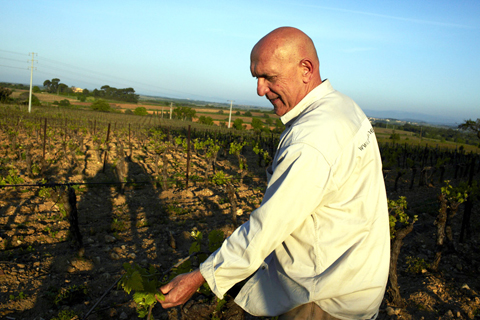Paul Jeune started working in his father’s vineyard at the age of 14 and has traced his family’s winemaking history back to an ancestor born in 1775. But he says his way of life is under threat from plans to legalize in France the winemaking methods pioneered in the US and Australia.
Jeune, along with most French winemakers, opposes EU plans to relax strict rules governing the making of rose, or blush, wines just as they are starting to gain respect — and sales.
Currently, red grapes are usually crushed and left to ferment briefly with the skins, the two being separated before the juice colors fully to produce blush wines. The EU proposal would allow Europeans to simply blend red and white wine together to create a pink blend — a less complex method used by New World producers.

PHOTO: NY TIMES NEWS SERVICE
“If you do this, why not allow people to make wine without any grapes at all?” Jeune asks, growing steadily more voluble over a glass of his own rose, from grapes grown in Provence. “You could do it in a laboratory, with alcohol, water, artificial flavors.”
Only some of the rose wine made outside France is blended; many New World winemakers employ the traditional method, using only red grapes. Some wineries use both methods.
But clearly the dispute has touched a nerve here, bringing accusations that the planned EU change will vulgarize rosi and undermine its blossoming reputation.
“We are trying to save a certain style of winemaking and they make more problems; they denigrate our profession,” Jeune said, as the sun set over the scenic vineyard of a fellow winemaker near Beziers, in the southern region of Languedoc. “It’s a scandal.”
Vintners also see the move as another measure that will allow traditional winemakers to be squeezed out by beverage multinationals. And the controversy has touched off a debate over whether New World winemakers are saving rosi or wrecking it.
The European Commission argues its changes make sense.
“There has been a lot of ooh-la-la-ing about this without too much regard for the facts,” said Michael Mann, its spokesman.
One compromise would allow France to label “traditional rose” to set it apart, though New World exporters would not be forced to identify blended wine.
In Languedoc, Anne Sutra de Germa, who runs a small winery, Domaine Monplezy, and also opposes change, is optimistic.
“In some ways it’s good to have stupid laws,” she said. “Because the consumer who wants good wine will eventually find us.”

MORE VISITORS: The Tourism Administration said that it is seeing positive prospects in its efforts to expand the tourism market in North America and Europe Taiwan has been ranked as the cheapest place in the world to travel to this year, based on a list recommended by NerdWallet. The San Francisco-based personal finance company said that Taiwan topped the list of 16 nations it chose for budget travelers because US tourists do not need visas and travelers can easily have a good meal for less than US$10. A bus ride in Taipei costs just under US$0.50, while subway rides start at US$0.60, the firm said, adding that public transportation in Taiwan is easy to navigate. The firm also called Taiwan a “food lover’s paradise,” citing inexpensive breakfast stalls

TRADE: A mandatory declaration of origin for manufactured goods bound for the US is to take effect on May 7 to block China from exploiting Taiwan’s trade channels All products manufactured in Taiwan and exported to the US must include a signed declaration of origin starting on May 7, the Bureau of Foreign Trade announced yesterday. US President Donald Trump on April 2 imposed a 32 percent tariff on imports from Taiwan, but one week later announced a 90-day pause on its implementation. However, a universal 10 percent tariff was immediately applied to most imports from around the world. On April 12, the Trump administration further exempted computers, smartphones and semiconductors from the new tariffs. In response, President William Lai’s (賴清德) administration has introduced a series of countermeasures to support affected

CROSS-STRAIT: The vast majority of Taiwanese support maintaining the ‘status quo,’ while concern is rising about Beijing’s influence operations More than eight out of 10 Taiwanese reject Beijing’s “one country, two systems” framework for cross-strait relations, according to a survey released by the Mainland Affairs Council (MAC) on Thursday. The MAC’s latest quarterly survey found that 84.4 percent of respondents opposed Beijing’s “one country, two systems” formula for handling cross-strait relations — a figure consistent with past polling. Over the past three years, opposition to the framework has remained high, ranging from a low of 83.6 percent in April 2023 to a peak of 89.6 percent in April last year. In the most recent poll, 82.5 percent also rejected China’s

PLUGGING HOLES: The amendments would bring the legislation in line with systems found in other countries such as Japan and the US, Legislator Chen Kuan-ting said Democratic Progressive Party (DPP) Legislator Chen Kuan-ting (陳冠廷) has proposed amending national security legislation amid a spate of espionage cases. Potential gaps in security vetting procedures for personnel with access to sensitive information prompted him to propose the amendments, which would introduce changes to Article 14 of the Classified National Security Information Protection Act (國家機密保護法), Chen said yesterday. The proposal, which aims to enhance interagency vetting procedures and reduce the risk of classified information leaks, would establish a comprehensive security clearance system in Taiwan, he said. The amendment would require character and loyalty checks for civil servants and intelligence personnel prior to